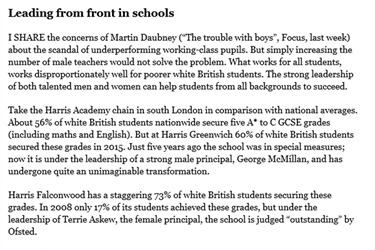Home /
News & Views /
News / The scandal of underperforming working-class pupils

Siobhain has argued for the need of 'absolute relentlessness' in schools, to tackle the problem of the under-performance of working-class pupils.
She celebrated the Harris Academy chain of schools, which have triumphed in radically improving the performance of students, with zero-tolerance policies on bullying, and an effective approach to tackling truancy.
Siobhain's article was written in response to Martin Daubney's article in the Times, '
The Trouble With Boys' (10th January 2016) which argued that working-class pupils were suffering because of the 'feminisation' of education.
You can read Siobhain's letter
online, or read it below.
'Leading from front in schools
I share the concerns of Martin Daubney (“The trouble with boys”, Focus, last week) about the scandal of underperforming working-class pupils.
But simply increasing the number of male teachers would not solve the problem. What works for all students, works disproportionately well for poorer white British students. The strong leadership of both talented men and women can help students from all backgrounds to succeed.
Take the Harris Academy chain in south London in comparison with national averages. About 56% of white British students nationwide secure five A* to C GCSE grades (including Maths and English).
But at Harris Greenwich 60% of white British students secured these grades in 2015. Just five years ago the school was in special measures; now it is under the leadership of a strong male principal, George McMillan, and has undergone quite an unimaginable transformation.
Harris Falconwood has a staggering 73% of white British students securing these grades. In 2008 only 17% of its students achieved these grades, but under the leadership of Terrie Askew, the female principal, the school is judged “outstanding” by Ofsted.
I also take issue with the accusation of the “feminisation” of education. As these two examples demonstrate, inspiring individuals can come in all shapes and sizes, and ultimately a female teacher from a working-class background will have more in common with white working-class boys than a male teacher from an affluent one.
Finally, we know what really works in schools, and it’s neither glamorous nor fashionable. What works is nothing short of absolute relentlessness, both in discipline and high achievement; a clear zero-tolerance policy on bullying; picking children up directly from their home if they have a habit of truanting; and providing breakfast clubs with nutritious food (undernourished children won’t concentrate) or after-school homework clubs so that every child has somewhere to study, even if it’s not at home.
Schools such as these get the best of all their students, whether white British or otherwise. The author is right to highlight this important and under-appreciated problem — but the answer is a little more rigorous than he thinks.'